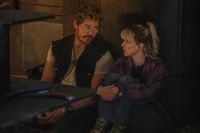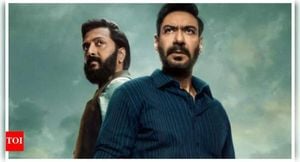In a stark reminder that even seasoned directors can stumble, The Electric State, directed by the Russo brothers, has struggled to find its footing during its opening weekend on Netflix. Despite being billed as the platform’s most expensive original film ever produced, with a staggering budget of $320 million, the movie's premiere has not sparked the fervor many had expected.
The Electric State, which debuted on March 14, 2025, follows the story of a young girl named Michelle, played by Millie Bobby Brown, in a dystopian world dominated by rogue robots. She teams up with a smuggler named Keats, portrayed by Chris Pratt, to search for her long-lost brother. Despite a star-studded cast that includes names like Anthony Mackie, Woody Harrelson, and Jenny Slate, the film managed to accumulate only 25.2 million views globally during its initial weekend, a figure that falls significantly short when compared to other blockbusters on the platform.
According to a March 18 post by Vulture's West Coast editor Joe Adalian, the film ranks just above other relatively low-performing titles like Rebel Moon — Part One: A Child of Fire and Unfrosted in Netflix’s cumulative viewership rankings for its first week. Adalian noted, "...‘The Electric State garnered only 25.2 million views globally during its opening weekend, well below big action hits like Carry On and The Gray Man, and likely won’t rank among the top 10 biggest opening weekends of the year.” This lukewarm reception is concerning for the Russo brothers, known for their previous successes within the Marvel Cinematic Universe, particularly films like Avengers: Endgame, which grossed $2.79 billion globally.
The Electric State adaptation comes from the beloved graphic novel by Simon Stålenhag, known for its haunting imagery and unique take on sci-fi. This ambitious project is being critiqued as a cautionary tale for the film industry, especially as the Russo brothers attempt to transition from blockbuster hits like Captain America: Civil War to Netflix originals. In his review, DECIDER contributor John Serba told viewers to "skip it," critiquing it as an overblown production lacking artistic vision.
The situation poses questions about the viability of massive budgets in an age where streaming services are racing to keep subscribers engaged. The Russo brothers' ambitious choices may not be paying off as anticipated, leading to speculation about future projects and their direction.
Despite this setback, the Russo brothers are preparing to return to the Marvel fold, set to direct upcoming installments of the Avengers franchise, aptly titled Avengers 5 and 6. The MCU has seen an evolution since the conclusion of its Infinity Saga in 2019, entering the Multiverse Saga with mixed success.
In a recent interview promoting their film, the Russo brothers acknowledged that Marvel faces challenges within its expansive narrative structure. They stated, "Yes, the MCU has become very vast, that’s for sure." This recognition indicates an awareness of the difficulties in maintaining a coherent storyline amidst a growing roster of films and characters.
Additionally, the tumultuous context in which they return to Marvel is noteworthy. Following controversies surrounding actor Jonathan Majors, originally slated to be a pivotal figure as Kang the Conqueror, the Russos are inheriting a franchise at a crossroads. In light of these developments, the narrative focus is poised for a reset, emphasizing a return to more centralized storytelling as the brothers express a desire to bring back a concentrated narrative approach.
Meanwhile, the cinematic landscape continues to evolve. With new projects lined up in the MCU, including the Thunderbolts and Fantastic Four, the Russo brothers’ next avengement is set to debut on April 26, 2026. Fans remain hopeful that their return signifies a remedy for the sprawling complexity that the Multiverse Saga has come to represent.
The journey ahead remains uncertain for both the Russo brothers and their latest endeavor, reinforcing the ever-changing dynamics of the film industry. As expectations soar with high stakes, both films and directors must continue to adapt to meet the increasing demands of audiences yearning for innovative storytelling.






